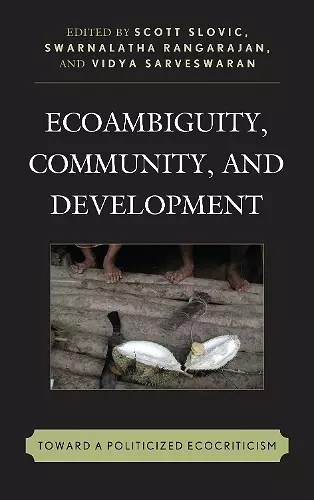Ecoambiguity, Community, and Development
Toward a Politicized Ecocriticism
Scott Slovic editor Swarnalatha Rangarajan editor Vidya Sarveswaran editor
Format:Paperback
Publisher:Lexington Books
Published:16th Oct '15
Currently unavailable, and unfortunately no date known when it will be back

Ecoambiguity, Community, and Development takes stock of cultural and environmental contexts in many different regions of the world by exploring literature and film. Artists and scholars working in the social ecology, environmental justice, and postcolonial arenas have long recognized that as soon as we tug on a thread of “ecodegradation,” we generally find it linked to some form of cultural oppression. The reverse is also often true. In the spirit of postcolonial ecocriticism, the studies collected by Scott Slovic, R. Swarnalatha, and Vidya Sarveswaran emphasize the impossibility of disentangling environmental and cultural problems. While not all the authors explicitly invoke Karen Thornber’s term “ecoambiguity” or the concepts and terminology of postcolonial ecocriticism, their articles frequently bring to light various ironies. For example, the fact that Ukrainian environmental experience in the twenty-first century is defined by one of the world’s most infamous industrial disasters, the Chernobyl nuclear accident of 1986, yet Ukrainian culture, like many throughout the world, actually cherishes a profound, even animistic, attachment to the wonders of nature. The repetition of this and other paradoxes in human cultural responses to the more-than-human world reinforces our sense of the congruities and idiosyncrasies of human culture. Every human culture, regardless of its condition of economic and industrial development, has produced its own version of “environmental literature and art”—but the nuances of this work reflect that culture’s precise social and geophysical circumstances. In various ways, these stories of community and development from across the planet converge and diverge, as told and explained by distinguished scholars, many of whom come from the cultures represented in these articles.
A new critical formation, sometimes called environmental humanities, has been successfully interrogating the assumptions about nature, history, and culture made by an earlier generation of largely European and North American writers, scholars, and activists. This collection of thoughtful and stimulating essays, arranged and introduced superbly by the editors, continues with this essential task of building a properly worldly analysis and interpretation of our current environmental crises—a task on which, quite literally, our lives might depend. -- Upamanyu Pablo Mukherjee, Warwick University
This intriguing collection is like an odyssey into the hermeneutics of “ecoambiguity.” It sheds light on the problematic entanglements of ecodegradation and social repression with vivid local examples from the Global South. The essays here explore how ecoambiguity emerges from the contested intersectional sites of environmental and social justice. They reveal the contingencies of nature-culture interactions when pressing environmental problems are materially bound up with social distress and cultural oppression. Zeroing in on a particular local narrative, each essay unravels the spectral lines that disclose ecoambiguity as a historical and political process of inadvertent collisions between people and the environment. The co-extensivity of ecological devastation with poverty, pollution, domestic colonialism, and industrial development is so well expressed that the ambivalences of eco-deterioration immediately make sense. -- Serpil Oppermann, Professor of English, Hacettepe University, and President of EASLCE
This is a dynamic, wide-ranging collection. It offers powerful testimony to the entanglement between cultural and environmental challenges. It also reminds us of the power of literature and film as imaginative resources for deepening our understanding of those challenges. The book’s geographical reach is unusual and impressive. -- Rob Nixon, Currie C. and Thomas A. Barron Family Professor in the Humanities and the Environment, Princeton University
This innovative collection decisively outlines why environmental justice and postcolonial theories are taking hold among the ecocritics at work in China, Japan, India, Ukraine, Mexico, and Brazil, and other indigenous or first nations—such as the Mohawk. Distinguished established scholars, and important new voices in the field, many from the cultures about which they write, confront the paradoxical tendencies of selective cultural appreciation and destruction found in some of the globe’s most talked-about ‘developing’ nations. The result is a powerful and highly engaging new contribution to the field that will challenge conventional assumptions about the environmentalism(s), literatures, and films of the nations, regions, and communities under analysis. -- Joni Adamson, co-editor, American Studies, Ecocriticism, and Citizenship: Thinking and Acting in the Local and Global Commons
An excellent and timely collection, consolidating recent advances in postcolonial ecocriticism but pushing it in new directions and applying its theories and methods to under-represented parts of an increasingly connected but unevenly developed and culturally differentiated world. The early chapters on China, Tibet, and Japan are especially useful insofar as these complex regions rarely feature in more conventional accounts of postcolonial ecocriticism; but all the essays here make significant contributions to a densely political field which, in lead author Karen Thornber’s words, ‘further ambiguates [rather than resolves] the ecological conundrums it describes.’ -- Graham Huggan, Chair of Commonwealth and Postcolonial Literatures, School of English, University of Leeds
ISBN: 9781498525367
Dimensions: 232mm x 149mm x 15mm
Weight: 327g
214 pages